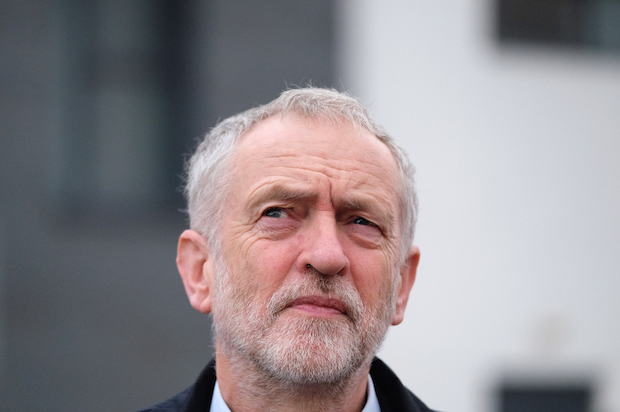Europe has opened up an unbridgeable chasm in the Conservative party. Labour remains, near as dammit, united. On the EU referendum, an opposition accustomed to defeat has a rare chance of victory. Yet when Jeremy Corbyn makes the case for staying in he speaks without conviction. Like a man called into work on his day off, his weary expression and dispirited voice tell you he would rather be somewhere else. Tory MPs, so divided that it is hard to see how they can stay in the same party, unite in laughing at him.
The Labour leadership and most of the unions seem unaware that this is a fight over the future of Britain. Their strange indifference may help the opponents of the EU prevail. The ‘out’ campaign offers a simple explanation for the left’s lethargy: in their hearts Corbyn, Unite and the rest do not want us to stay in the EU. As one Vote Leave spokesman said, ‘It’s extremely sad to see that Jeremy, who is for all his faults a conviction politician and a lifelong opponent of the EU, has been gagged by the clapped-out Blairites rejected in the Labour leadership contest.’
But Vote Leave fails to understand the Labour party as it fails to understand so much else. It is not that Corbyn secretly wants Britain to withdraw from the EU. It is that he all too obviously does not care about it. When Corbyn asked moderate Labour politicians to serve in his shadow cabinet, many found the idea of working for him repugnant. Those who agreed — for the good of the party — insisted that Corbyn commit to campaign to keep Britain in Europe. ‘It was like pinning jelly to a wall,’ one told me. ‘I kept telling him, “It’s a yes or no choice, Jeremy, in or out. There is no ‘maybe’ or ‘Only if the EU does what I want’ on the ballot paper.” He kept wandering away from the subject, and I kept having to drag him back.’
You must take a crash course in the biases of the far left to understand its sins of omission and commission. David Cameron got close to the truth when, in a voice full of fake pity, he told that Corbyn his pro-EU stance may cause his allies to accuse him of ‘being a member of an establishment’. Just so. The far left calls all who deviate from its sacred texts ‘red Tories’, ‘Blairite-Tories’, ‘Torylites’ or even — brace yourselves — ‘Tories’. Treason, a charge Corbynistas have thrown at so many others, will be thrown back at them. In foreign affairs, this commitment-phobia explains the willingness to go along with any anti-western movement, however racist, sexist or genocidal it might be, which has disgraced my generation of leftists as surely as support for Stalin disgraced leftwingers in the 1930s.
In domestic policy, however, the instinct to find fault with those who say, for instance, that Britain’s justice system is the best in the world, or that our future can only be in the European Union, is not a bad reflex. Without the urge to unravel such complacency, faults are never exposed and reform is never attempted. But such a tendency can easily develop into nervous tics and then compulsive disorders. If left-wingers and union leaders could bring themselves to think strategically, they would be scared out of their skins by the prospect of Britain withdrawing from the EU. ‘Splendid isolation’ would be anything but splendid for them. The Tories would oust Cameron and his replacement would be even more right-wing. The social and economic protection provided by EU membership would vanish.
Yet the left cannot bring itself to campaign wholeheartedly for Britain to stay in. For that would mean accepting that the EU had values worth defending — despite its disgraceful treatment of southern Europe and its attempts to promote a free-trade area, from which left-wingers instinctively recoil. And so Unite spends most of its time worrying that the mooted free-trade agreement between the EU and the US will lead to the privatisation of the NHS. And Frances O’Grady, the current TUC general secretary, does not share the enthusiasm for the EU of her predecessors. In Labour circles, the conventional view is that the far left’s commitment-phobia does not matter. Alan Johnson and Hilary Benn are leading the Labour campaign for ‘in’ and they are politicians with open minds, skilful in debate, who can secure the Labour vote.
I am not so sure. Corbyn may be an electoral disaster waiting to happen but he has the support of the two or three million people in Britain who define themselves as leftists. Their votes will matter, and if the EU referendum doesn’t bother their leader, they may wonder why they should bother to vote at all. The trade unions may not be what they were, but they can still run an effective campaign. Yet with a few exceptions, they are refusing to think strategically. How can they? If the unions and the wider left were to think strategically, they would have to accept that the leaders they have helped to impose on the Labour party — first Miliband and now Corbyn — have benefited no one except the Conservatives.
They would have to accept that they should remove Corbyn from office before he loses Labour another election. They would have to accept, in short, that the willingness to compromise is not the same as the desire to sell out. And this they show no signs of doing.
This is a preview from the new issue of The Spectator, out tomorrow.
REFERENDUM 2016: THE BATTLE AHEAD
Join Isabel Hardman, James Forsyth and Fraser Nelson at the ICA, near Trafalgar Square, to discuss the campaign with Ben Page, pollster at Ipsos Mori. A subscriber-only event. To book, click here. To subscribe from £1/week, click here.








Comments